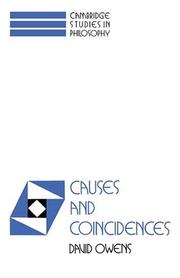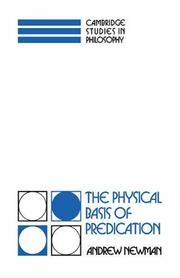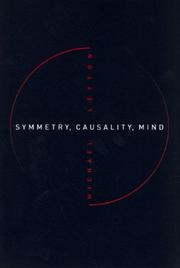| Listing 1 - 4 of 4 |
Sort by
|

ISBN: 0521416507 0521044480 0511520069 Year: 1992 Volume: vol *14 Publisher: Cambridge : Cambridge University Press,
Abstract | Keywords | Export | Availability | Bookmark
 Loading...
Loading...Choose an application
- Reference Manager
- EndNote
- RefWorks (Direct export to RefWorks)
In an important departure from theories of causation, David Owens proposes that coincidences have no causes, and that a cause is something which ensures that its effects are no coincidence. In Causes and Coincidences, he elucidates the idea of a coincidence as an event which can be analysed into constituent events, the nomological antecedents of which are independent of each other. He also suggests that causal facts can be analysed in terms of non-causal facts, including relations of necessity. Thus, causation is defined in terms of coincidence, and coincidence without reference to causation. David Owens challenges the ideas associated with Hume, Davidson and Lewis, constructing a theory which distinguishes nomological necessity and sufficiency from their logical counterparts. He is able to offer novel solutions to the major problems of causation, including the direction of causation, the logical form of causal statements, the distinction betwen causal connections and logical connections, and the relationship between psychological and physical causation.
Causaliteit --- Causalité --- Causation --- Coincidence --- Gelijktijdigheid --- Oorzakelijkheid --- Simultanéité --- Coïncidence --- Simultaneousness --- Synchronicity --- Synchronism --- Chance --- Simultaneity (Physics) --- Causality --- Cause and effect --- Effect and cause --- Final cause --- Beginning --- God --- Metaphysics --- Philosophy --- Necessity (Philosophy) --- Teleology --- Causation. --- Coincidence. --- Causalité --- Coïncidence --- Arts and Humanities
Book
ISBN: 8879161334 9788879161336 Year: 1992 Volume: 187 Publisher: Milano LED
Abstract | Keywords | Export | Availability | Bookmark
 Loading...
Loading...Choose an application
- Reference Manager
- EndNote
- RefWorks (Direct export to RefWorks)
Causation --- Knowledge, Theory of --- Reason --- Mind --- Intellect --- Rationalism --- Epistemology --- Theory of knowledge --- Philosophy --- Psychology --- Causality --- Cause and effect --- Effect and cause --- Final cause --- Beginning --- God --- Metaphysics --- Necessity (Philosophy) --- Teleology --- Kant, Immanuel --- Kant, Immanuel, --- Knowledge, Theory of. --- Causation. --- Reason. --- Kant (emmanuel), philosophe allemand, 1724-1804 --- Critique et interpretation

ISBN: 9780521411318 9780511663833 9780521037617 0521411319 0521037611 0511663838 Year: 1992 Publisher: Cambridge : Cambridge University Press,
Abstract | Keywords | Export | Availability | Bookmark
 Loading...
Loading...Choose an application
- Reference Manager
- EndNote
- RefWorks (Direct export to RefWorks)
In this book about metaphysics the author defends a realistic view of universals, characterizing the notion of universal by considering language and logic, the idea of possibility, hierarchies of universals, and causation. He argues that neither language nor logic is a reliable guide to the nature of reality and that basic universals are the fundamental type of universal and are central to causation. All assertions and predications about the natural world are ultimately founded on these basic universals. A distinction is drawn between unified particulars (which reveal natural principle of unity) and arbitrary particulars (which lack such a principle); unified particulars are the terms of causal relations and thus the real constituents of the world. The world is not made up of events but of unified particulars and basic universals.
Individuatie (Filosofie) --- Individuation (Philosophie) --- Particularia (Filosofie) --- Particuliers (Philosophie) --- Querelle des universaux --- Universalia (Filosofie) --- Universaliën (Filosofie) --- Universaliënstrijd --- Universaux (Philosophie) --- Universaux [Querelle des ] --- Verenkeling (Filosofie) --- Universaux --- Universals (Philosophy) --- Individuation (Philosophy) --- Causation. --- Individuation (Philosophy). --- Universals (Philosophy). --- Causation --- Causalité --- Individu (Philosophie) --- Universals (Logic) --- Individuals (Philosophy) --- Individuation --- Particulars (Philosophy) --- Causality --- Cause and effect --- Effect and cause --- Final cause --- Knowledge, Theory of --- Logic --- Philosophy --- Scholasticism --- Whole and parts (Philosophy) --- Haecceity (Philosophy) --- Beginning --- God --- Metaphysics --- Necessity (Philosophy) --- Teleology --- Arts and Humanities

ISBN: 0262121638 0262278316 0585086303 9780585086309 9780262621311 0262621312 9780262121637 9780262278317 Year: 1992 Publisher: Cambridge (Mass.): MIT press
Abstract | Keywords | Export | Availability | Bookmark
 Loading...
Loading...Choose an application
- Reference Manager
- EndNote
- RefWorks (Direct export to RefWorks)
Cognitive psychology --- Theory of knowledge --- Causation --- Symmetry --- Time perception --- Causalité --- Symétrie --- Perception du temps --- Psychological aspects --- Aspect psychologique --- -Time perception --- Chronometry, Mental --- Duration, Intuition of --- Intuition of duration --- Mental chronometry --- Time --- Time, Cognition of --- Time estimation --- Orientation (Psychology) --- Perception --- Aesthetics --- Proportion --- Causality --- Cause and effect --- Effect and cause --- Final cause --- Beginning --- God --- Metaphysics --- Philosophy --- Necessity (Philosophy) --- Teleology --- Time perception. --- Causation. --- Form Perception --- Time Perception --- Cognition --- Memory --- Epidemiologic Factors --- Mental Processes --- Learning --- Space Perception --- Quality of Health Care --- Visual Perception --- Public Health --- Psychological Phenomena and Processes --- Health Care Quality, Access, and Evaluation --- Psychiatry and Psychology --- Environment and Public Health --- Health Care --- Psychology --- Social Sciences --- Psychological aspects. --- Causalité --- Symétrie --- Community-Based Distribution --- Contraceptive Distribution --- Delivery of Healthcare --- Dental Care Delivery --- Distribution, Non-Clinical --- Distribution, Nonclinical --- Distributional Activities --- Healthcare --- Healthcare Delivery --- Healthcare Systems --- Non-Clinical Distribution --- Nonclinical Distribution --- Delivery of Dental Care --- Health Care Delivery --- Health Care Systems --- Activities, Distributional --- Activity, Distributional --- Care, Health --- Community Based Distribution --- Community-Based Distributions --- Contraceptive Distributions --- Deliveries, Healthcare --- Delivery, Dental Care --- Delivery, Health Care --- Delivery, Healthcare --- Distribution, Community-Based --- Distribution, Contraceptive --- Distribution, Non Clinical --- Distributional Activity --- Distributions, Community-Based --- Distributions, Contraceptive --- Distributions, Non-Clinical --- Distributions, Nonclinical --- Health Care System --- Healthcare Deliveries --- Healthcare System --- Non Clinical Distribution --- Non-Clinical Distributions --- Nonclinical Distributions --- System, Health Care --- System, Healthcare --- Systems, Health Care --- Systems, Healthcare --- Healthcare Quality, Access, and Evaluation --- Psychologic Processes and Principles --- Environment, Preventive Medicine & Public Health --- Environment, Preventive Medicine and Public Health --- Health, Public --- Perception, Visual --- Perceptions, Visual --- Visual Perceptions --- Quality of Care --- Quality of Healthcare --- Care Qualities --- Care Quality --- Health Care Quality --- Healthcare Quality --- Memory Training --- Phenomenography --- Training, Memory --- Human Information Processing --- Information Processing, Human --- Determinant, Epidemiologic --- Determinants, Epidemiologic --- Epidemiologic Determinant --- Epidemiologic Factor --- Factor, Epidemiologic --- Factors, Epidemiologic --- Epidemiologic Determinants --- Perceptions --- Cognitive Function --- Cognitions --- Cognitive Functions --- Function, Cognitive --- Functions, Cognitive --- Perception, Time --- Perceptions, Time --- Time Perceptions --- Contour Perception --- Contour Perceptions --- Form Perceptions --- Perception, Contour --- Perception, Form --- Perceptions, Contour --- Perceptions, Form --- Enabling Factors --- Multifactorial Causality --- Multiple Causation --- Predisposing Factors --- Reinforcing Factors --- Causalities --- Causalities, Multifactorial --- Causality, Multifactorial --- Causation, Multiple --- Causations --- Causations, Multiple --- Enabling Factor --- Factor, Enabling --- Factor, Predisposing --- Factor, Reinforcing --- Factors, Enabling --- Factors, Predisposing --- Factors, Reinforcing --- Multifactorial Causalities --- Multiple Causations --- Predisposing Factor --- Reinforcing Factor --- Perception, Space --- Perceptions, Space --- Space Perceptions --- Psychologic Processes --- Psychological Processes --- Phenomena, Psychological --- Processes, Psychologic --- Processes, Psychological --- Psychological Phenomenas --- Psychological Processe --- Community Health --- Health, Community --- Preventive Medicine --- Education, Public Health Professional --- Vision, Ocular --- Pharmacy Audit --- Audit, Pharmacy --- Pharmacy Audits --- Memory Consolidation --- Education --- Sensation --- Executive Function --- Contrast Sensitivity --- Spatial Learning --- Visual Processing --- Processing, Visual --- Sensory Processing --- Processing, Sensory --- Temporal Perception --- Temporal Processing --- Time Processing --- Perception, Temporal --- Processing, Temporal --- Processing, Time --- Mediation Analysis --- Psychological Phenomena --- Psychiatry
| Listing 1 - 4 of 4 |
Sort by
|

 Search
Search Feedback
Feedback About
About Help
Help News
News